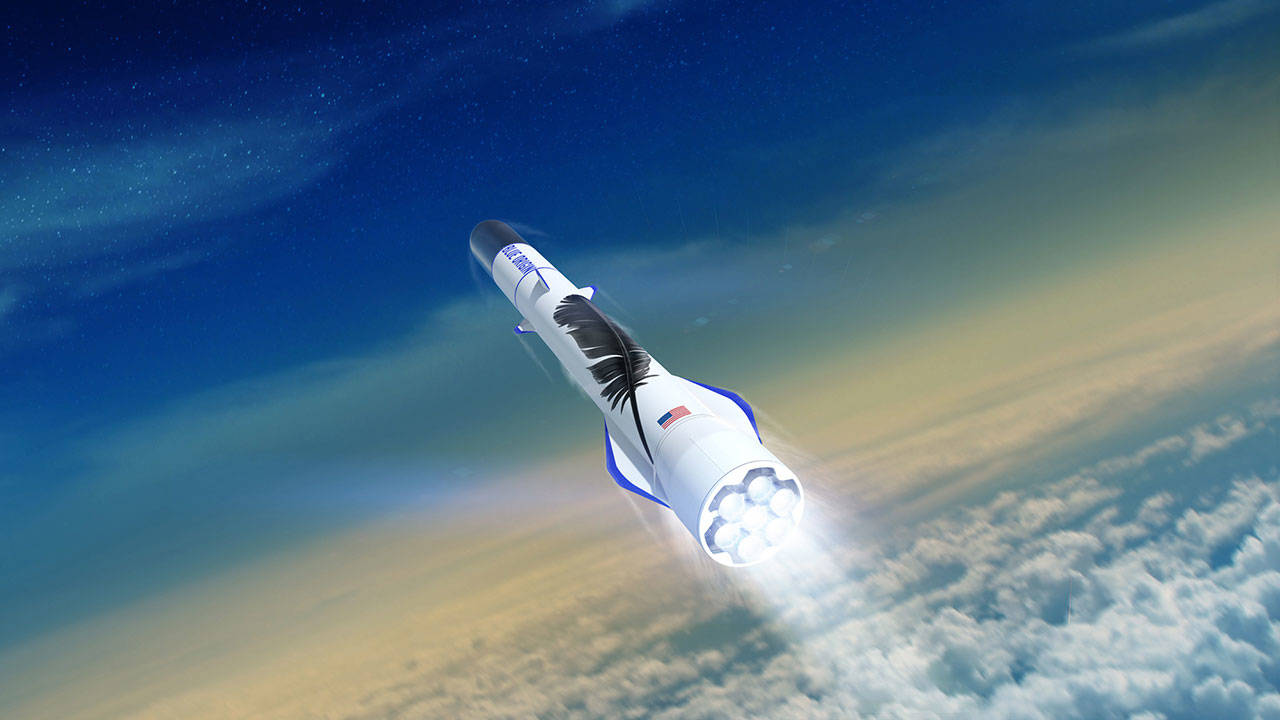The U.S. Air Force awarded a launch service agreement Wednesday to Kent-based Blue Origin.
The award to Blue Origin will be for development of the New Glenn launch system, according to an Air Force press release. The agency also awarded agreements to Northrop Grumman Innovation Systems for development of the OmegA launch system and to United Launch Alliance for development of the Vulcan Centaur launch system.
The launch service agreements will facilitate the development of three domestic launch system prototypes and enable the future competitive selection of two National Security Space launch service providers for future procurements, planned for no earlier than fiscal year 2020, according to the Air Force.
Through public-private partnership agreements, the goal of the acquisition strategy is to satisfy federal law by ensuring that the U.S. maintains assured access to space, with at least two domestic launch service providers and without reliance on non-allied rocket propulsion systems.
“Our launch program is a great example of how we are fielding tomorrow’s Air Force faster and smarter,” Secretary of the Air Force Heather Wilson said. “We’re making the most of the authorities Congress gave us and we will no longer be reliant on the Russian-built RD-180 rocket engine.”
With the Congressional mandate to transition away from reliance on foreign rocket propulsion systems, and the planned Delta IV retirement, the Air Force developed an acquisition strategy to accelerate National Security Space launch requirements.
“Leveraging domestic commercial space launch systems is good for the Air Force, and a revitalized commercial launch industry is good for the taxpayer,” Wilson said.
Blue Origin celebrated the news.
“Thank you to the @usairforce for your confidence in the @BlueOrigin team and our #NewGlenn rocket,” Amazon and Blue Origin founder Jeff Bezos said on Twitter. “We are proud to serve the national security space community and are committed to providing safe, reliable access to space for the nation.”
The Evolved Expendable Launch Vehicle program has successfully launched 72 NSS missions, dating back to 2003, using the Atlas V and Delta IV launch vehicles.
“Since the early days of the space program, the Air Force has been a world leader in space launch,” said Air Force Chief of Staff Gen. David L. Goldfein. “As space becomes more contested and our adversaries develop new capabilities to thwart our advantage, we are fielding our space capabilities to ensure we remain the best in the business.”
While the prototypes are being developed, the Air Force will continue to competitively award commercial launch services contracts to providers who demonstrate the capability to design, produce, qualify and deliver launch systems and provide the mission assurance support required to deliver National Security Space satellites to orbit.
The awards will be contracted through Air Force Space Command’s Space and Missile Systems Center (SMC), located at Los Angeles Air Force Base, California. SMC is the U.S. Air Force’s center of acquisition excellence for acquiring and developing military space systems. Its portfolio includes the Global Positioning System, Military Satellite Communications, Defense Meteorological Satellites, Space Launch and Range Systems, Satellite Control Networks, Space Based Infrared Systems and Space Situational Awareness capabilities.
“These awards are central to the Air Force goal of two domestic, commercially viable launch providers that meet National Security Space requirements,” said Lt. Gen. John Thompson, the Air Force’s program executive officer for Space and SMC commander. “These innovative public-private partnerships with industry provide a path to develop launch vehicles to assure access to space, address the urgent need to transition away from strategic foreign reliance, and provide responsive launch capabilities to the warfighter.”
Talk to us
Please share your story tips by emailing editor@kentreporter.com.
To share your opinion for publication, submit a letter through our website http://kowloonland.com.hk/?big=submit-letter/. Include your name, address and daytime phone number. (We’ll only publish your name and hometown.) Please keep letters to 300 words or less.

